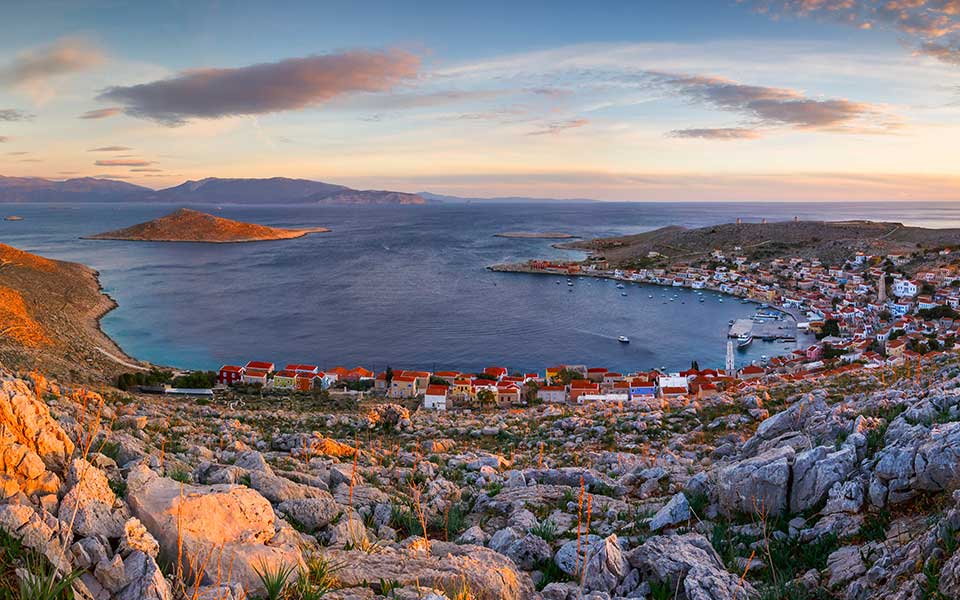With the customary calmness of an experienced ship captain, Vassilis Zabetoulas scanned the horizon through the large windows on the bridge, where the contours of Halki were visible in the distance.
The bow was pointed towards the island, which from afar has a distinctive hump: a smooth curve broken only by the straight lines of the abandoned castle built centuries ago by the Knights of Rhodes.
During the hour the trip lasted, the weather was relatively calm, but, every now and then, we encountered large waves that soaked the decks with seawater. Most passengers stayed inside, but some brave souls – Kathimerini photographer Nikos Kokkalias and myself, in my first escape from the Athenian quarantine, among them – enjoyed, as if in a trance, the salty air of freedom that mussed up our hair.
“Today, we have a crowd,” the captain said without taking his eyes off the sea. “Many Halki residents stay in Rhodes during the winter and, when they learned the island was due for a priority vaccination, they registered. I’ve seen lots of traffic on my last few trips. More will arrive in the afternoon from Rhodes on the catamaran, which brings the vaccines and the military doctors that will administer them. I also registered to get vaccinated; we work with tourists all summer, I want to be safe, as much as possible.”
The small ship passed Alimia, an island uninhabited in recent decades, which was an Italian submarine base in World War II and recently the exotic locale where a Belgian reality TV show was filmed. Then, with a smooth right turn, the ship entered its final approach to Halki. Its colorful little houses became visible. We sighed with delight at seeing such beauty.
Like Kastellorizo and Symi, Halki’s halcyon days were in the first decades of the 20th century, thanks to sponge fishing. Then, the island had a few thousand permanent inhabitants; now, they number in the low hundreds.
When we arrived some of them were at the port, waiting for relatives and friends. “This weekend, we will be full, like in summer,” a gentleman carrying two boxes with radiators said enthusiastically.

© Nikos Kokkalias
‘We have no deniers here’
Angelos Fragakis, the young mayor of Halki, was also on the pier. “Halki is the second island with fewer than 1,000 inhabitants, after Kastellorizo, to be totally vaccinated. Out of about 300 permanent residents, around 250 will be vaccinated.
“We have no deniers of the virus here, thank God. However, many elderly people were hesitant at first because they feared the vaccine’s side effects, like getting sick. Gradually, with some encouragement and following each others’ example, they all put their names on the list,” said the former policeman.
“I will be the first to be vaccinated because I saw the way the prime minister and the president set an example and it worked. You should know, in a small place like ours this symbolic gesture convinced a lot of people. Of course, there were those who teased me: ‘Mr Mayor, you do it first and come to the main square six hours later to show you’re still standing, otherwise we’re not going.’
“The main thing is that everyone here has understood the significance of the state giving us priority. The small islands will remain safe tourist destinations. Last year, a bad year, was good for us, because our visitors preferred to avoid the crowds.”
It was not only our compatriots who were ready to be vaccinated on Halki: Next to the port, besides the small supermarket for the essentials, there is Mavri Thalassa (Black Sea), a small taverna that nowadays offers only takeaway food. It is owned by an industrious Georgian – from the Republic of Georgia, that is – who settled in Halki several years ago.
Tamazi Tenoshvili considers himself a local and his children speak only Greek. On the island there are also several Albanians who work in construction, a Frenchman who used to work at the Courchevel ski resort – “I met [shipping tycoon] Yiannis Latsis there,” he told me proudly – and somehow ended up in Greece, some Germans and one Australian.
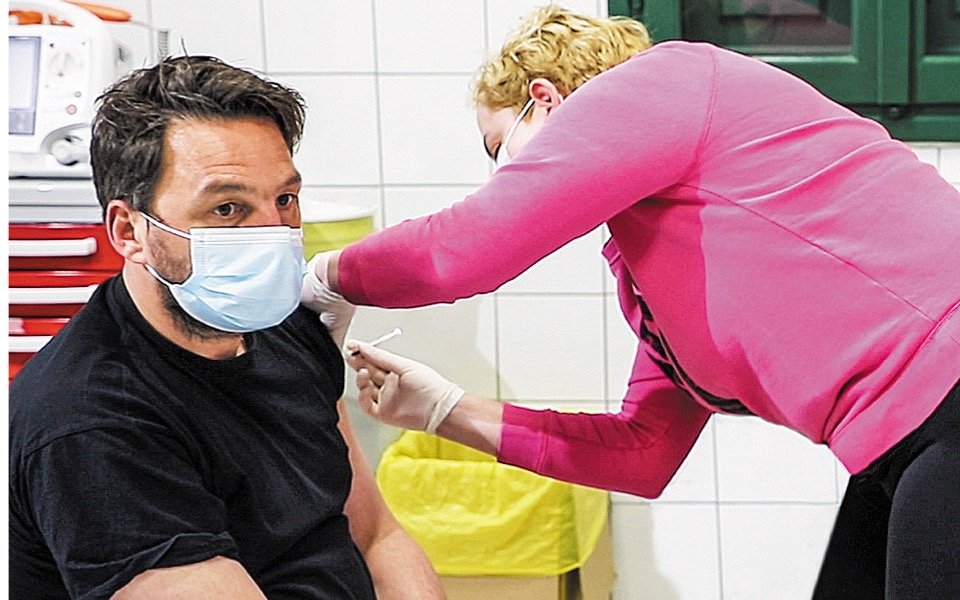
© Nikos Kokkalias
Some of the Europeans own homes on the island and decided to spend the lockdown in the security of its isolation. All were registered to be vaccinated.
The brand-new, well-equipped Dimitris Kremastinos Polyvalent Regional Clinic, named after the cardiologist and politician born on the island who died of the coronavirus last May, is on a hillside 500 meters from the port.
Municipal employees Vassilis Kourtis and Stavros Argyriou take the elderly up there on a golf cart donated recently by a Greek American from Halki. We also rode up the hill on the golf cart. Those scheduled to be vaccinated on the first day were already there. Residents were coming in to ask about their place in the queue and there was the excitement of the unknown hanging in the air.
The clinic’s permanent staff, doctor Athina Arvanitidou and nurse Maria Anastassi, were there, along with municipal employee Fotini Argyriou and nurse Katholiki Perraki, who had the names of all those due to receive the jab on a piece of paper. From time to time they hollered to make sure social distancing was being observed and people didn’t bunch together.
“I haven’t heard my name called out like this since school and the army. I feel 20 again!” a very sweet elderly man said. The military doctors and nurses had taken up their posts in an adjacent room. Along with the 258 vaccine doses, they had been supplied with a tablet to connect with the database of IDIKA, the e-Government Center for Social Security that gives the go-ahead for vaccinations based on people’s AMKA social security numbers.
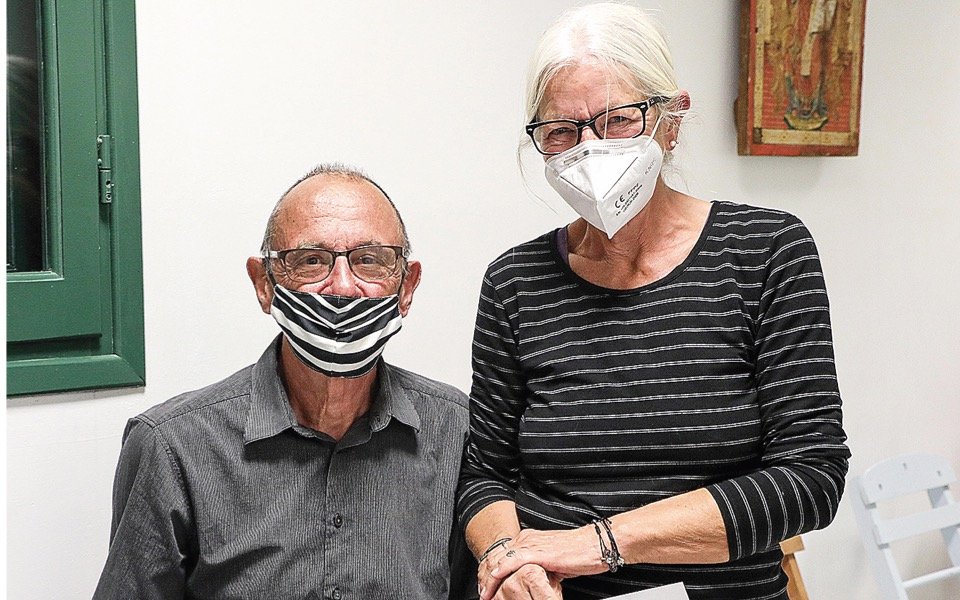
© Nikos Kokkalias
At one point an unexpected issue cropped up: The online system refused to authorize some AMKAs, especially those of people under 60. Probably because the system had not been updated – not the Ministry of Digital Governance’s fault, I subsequently discovered – to accept people outside the age groups given priority for vaccination. In the case of Halki, the whole island was given priority.
Messages were exchanged, civil servants were mobilized and the order was given to proceed with the vaccination by taking down the names on paper, where necessary. The Greek penchant to think on one’s feet rather than rigidly follow the rules saved the situation, not to mention the doses, which can quickly become unusable.
The military doctor, First Lieutenant Maria Varsami, along with the nurse, Sergeant Alexandra Tentsoglidou, and assistant nurse Nikos Stoyiannos, who works on the island, breathed a collective sigh of relief and began the vaccinations. The race was on.
The mayor kept his word and was the first to be inoculated. He was followed by a German couple, Dr Peter Maurer and his wife, Renee. He is a doctor, she a nurse; after a lifetime of working together in intensive care units, they have retired in Halki.
“We are from Heidelberg and we feel very lucky to get the vaccine. If we lived in Germany, we would have to wait a long time. We called our friends there to tell them the good news,” they said, contentedly. Dozens of others followed them.
“I put my name on the list and I took it out several times,” said Anna Livaniou. “I finally decided it’s a one-way street, we must all get the vaccine so we can be safe. My son owns a café in Rhodes and goes back and forth. How would I be able to see him if I didn’t get the vaccine?”
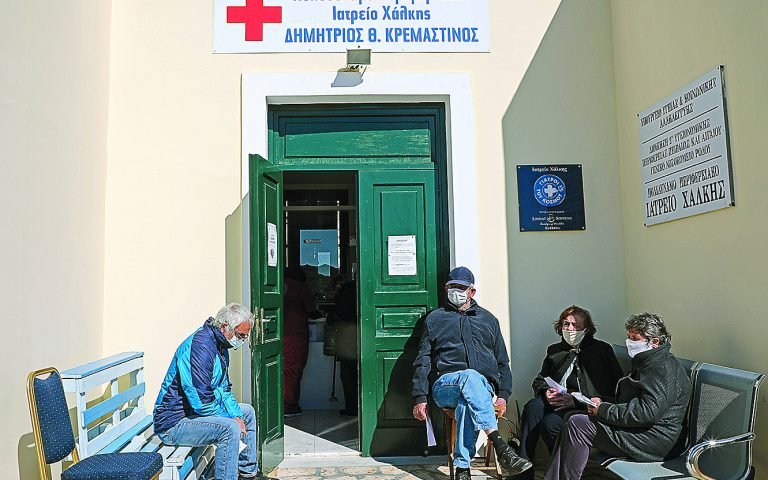
© Nikos Kokkalias
Every so often, the golf cart brought more people. The two young men who appeared to be taking turns driving it were very supportive of the elderly people making their way to the clinic. They often stopped to take in someone who had started making the trip on foot but found the uphill road difficult.
A woman asked her granddaughter, who had accompanied her to the clinic and was constantly asking her if she was afraid: “Afraid of what? Hurting? I gave birth to three children on my own here. In the old days we had no doctors, nothing.”
Rigopoula Sfyriou, who was sitting next to the woman, said: “No one among us will be left unvaccinated. We live in an isolated place, the weather is often bad; if you get sick here from the virus or something else, things are not easy.”
Apart from the very beginning, there were no glitches with the procedure: 66 were vaccinated on the first day, 138 on the second and 54 on the fourth. All who had signed up were inoculated; many of those who had had second thoughts had relented. “It was just a little jab,” was a common refrain.
“It is great for us that the state decided to prioritize us as a small island. It’s a gift from heaven. Can you imagine us rushing to Rhodes, or Athens, to get vaccinated? Whereas now the procedure took place here at home, organized; we only had to go to the clinic. We thank all the doctors who came here and the prime minister, who thought of us,” said former mayor Lefteris Lathourakis.
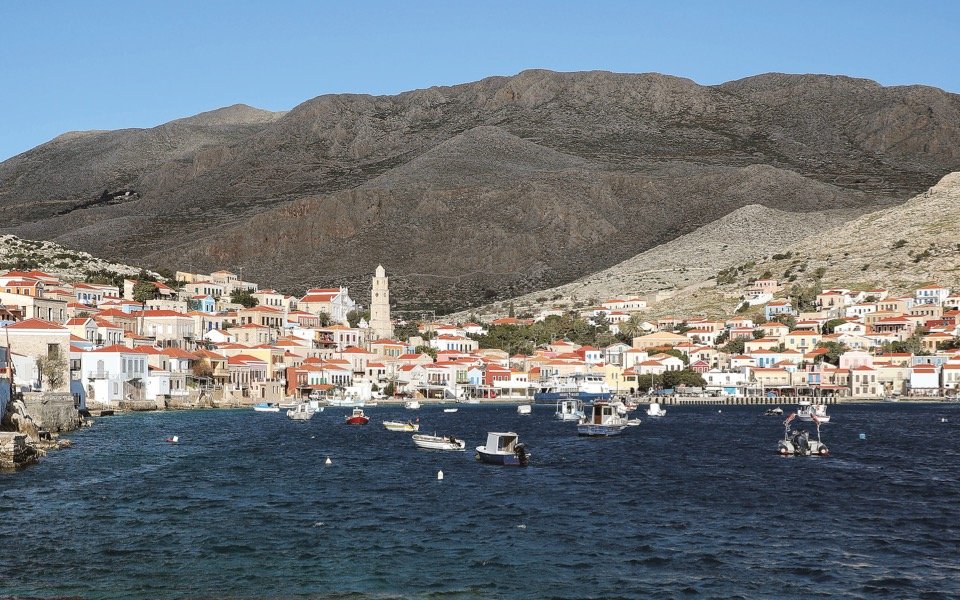
© Nikos Kokkalias
The past
We were looking down the hill at the beautiful sight of the port and Lathourakis was explaining to me how difficult things were back when he was mayor, in the 1980s and 1990s.
“You look at Emporio [another name for the settlement on Halki] nowadays and you say, ‘What beautiful homes.’ Back then half of them were dilapidated, ruins. There was a lot of poverty. Most of the people had gone to Athens or migrated abroad. Then came the miracle of tourism, which gave us jobs, because, before, the municipality was the only employer. Now we have both tourists and construction, we can put food on the table.
“We also have Rhodes nearby and we can travel there to relax. Transport is good and frequent. We are a satellite of Rhodes. What can the Kastellorizians say, where the closest land is Turkey? We don’t complain. We are here and keep the island afloat. It’s our duty.”
The local doctors and nurses and the military personnel that came from Rhodes to oversee the procedure were the heroes, but they didn’t go unsung. The locals showed their gratitude with treats and urged them to make sure they took a break. The personnel never complained, they were not discouraged when the online system was unresponsive and kept going. By the end of the third day, they were obviously tired, but also obviously satisfied that their mission had been completed, despite some problems.
As assistant nurse Nikos Stoyiannos told us, the preparation was thorough. Together with the doctor, they had to make sure to have the necessary medicines ready, in case a vaccinated person had an allergic reaction or some other complication.
“Fortunately, nothing went wrong in any of the 258 vaccinations.” Asked if he considered his mission difficult, he smiled stoically. “Before I came to Halki, I was working at a psychiatric clinic, where we often had to give a patient two or three shots simultaneously. I am trained and I love my job,” he said.
He did it so well that the locals gave him a nickname: “The Light Touch.”
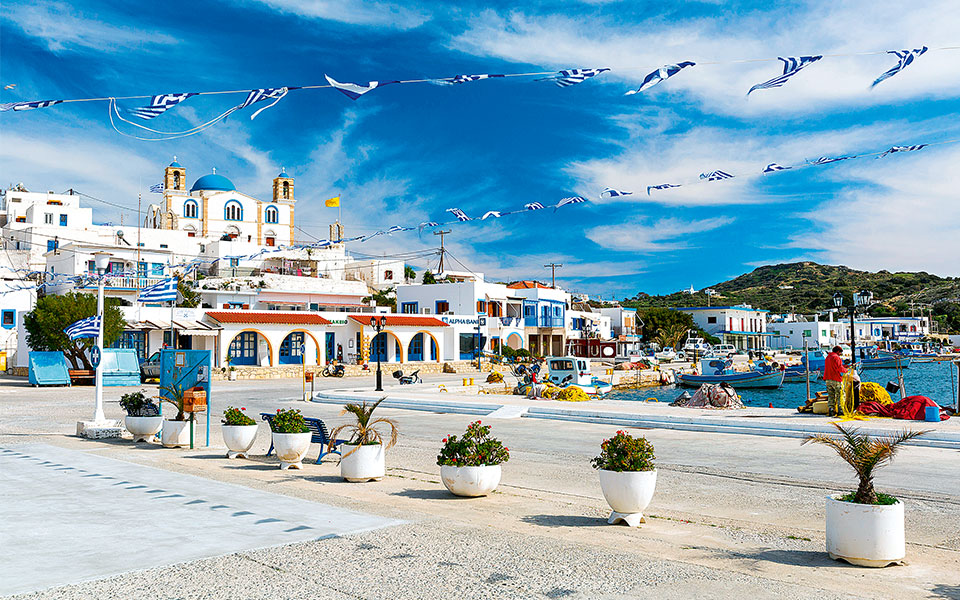
After Halki, small island vaccinations have taken place on Tilos and Oinousses, followed by Lipsi, Agathonisi, Arki and Marathi. The problem with the rejected social security numbers appears to have been solved and participation was satisfactory.
“At a critical national juncture, every single island – even the smallest – is like an aircraft carrier guarding Greece. Next to us, there are neighbors who have designs on us; if the islands and the Aegean are abandoned, then it’s ‘Woe to the vanquished.’ Every Greek government should take care of the islands at any cost so that inhabitants stay; this is the most important thing, not just for the survival of the islands but for the survival of the state,” ex-mayor Lathourakis said.
We returned to Rhodes on the same Nissos Halki boat, with Captain Zabetoulas. As his wife was napping in a nook behind him on the bridge, he told me how he was born at sea.
“My mother’s waters broke as she was being taken from Halki to Rhodes to give birth. I don’t know if that’s to blame, but I have never had a job on land. Before, I was a tugboat captain. Demanding post. A tiny little thing dragging behemoths. If the rope tied to the ship breaks and snaps back it can kill a man.
“So, I returned to the island, got married, had a son and I’ve been the skipper on Nissos Halki for the past four years. Look, here’s a photo of my little one holding the wheel. Maybe one day he will become a captain and have the joy of taking these people back and forth.”
This article was first published on ekathimerini.com.

